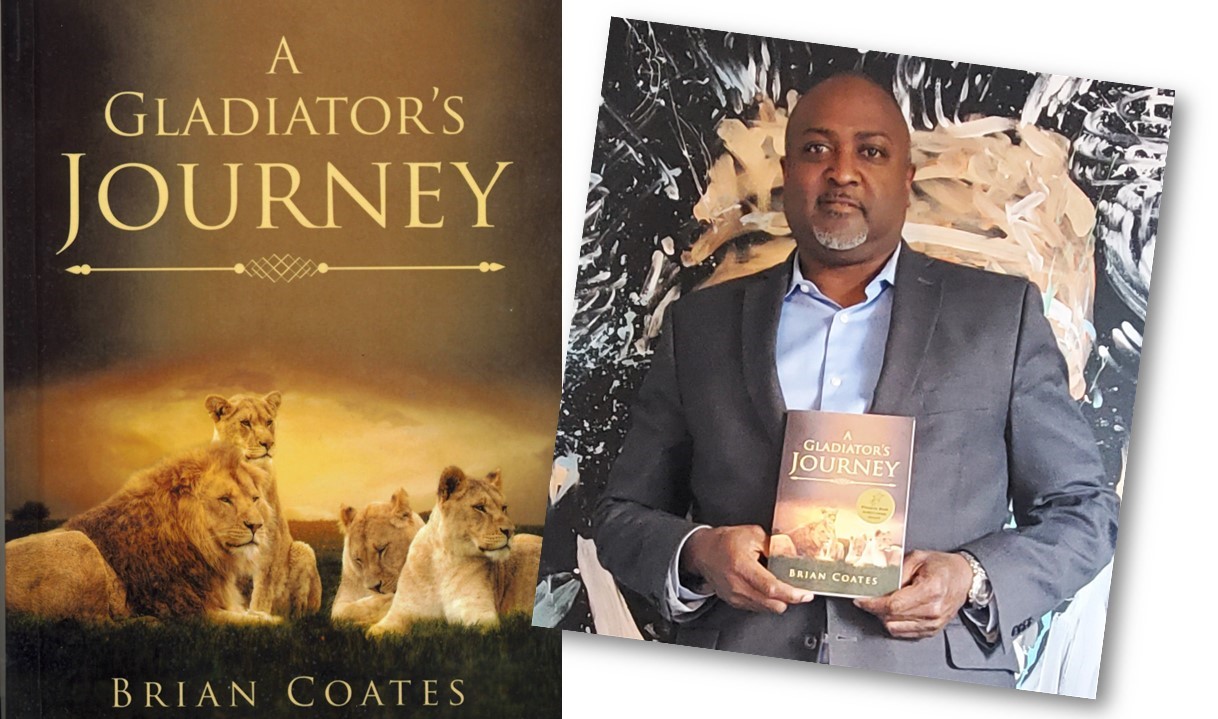Brian Coates finds power of written words through self-discovery
By Don Chaddock, Inside CDCR editor
For more than two decades, Brian Coates has worked for the department. Currently, he’s Associate Warden for CDCR’s Contract Beds Unit. Coates recently penned a book, “A Gladiator’s Journey,” and says he’s preparing for the next chapter of his life — retirement.
Looking back at a correctional career
Where have you worked for CDCR?
I have worked for CDCR for about 22 years and spent a number of years in CDCR’s Accounting and Budget Offices. Also, Correctional Business Manager for the Office of Reentry Facilities and at CSP-Solano. I currently work as an Associate Warden for the Contract Beds Unit, providing oversight of the Modified Community Correctional Facilities Program with cursory participation in the women’s Custody to Community Transitional Reentry Program (CCTRP).
What are some of the biggest changes you’ve seen in the department?
The biggest change I have seen has been in the area of rehabilitation. CDCR is doing great work in this area, especially with the CCTRP program. The CCTRP program has reduced recidivism immensely for the women in this program and gives them the opportunity to thrive as they return to the community.
Rewards come where you can find them
What do you find rewarding about your job?
I find that being able to be the voice of reason, and working in the background to make a difference, is very rewarding. When you work in a program that is not necessarily mainstream to the Departments mission, (Budget Office, Business Services, CBU), you don’t always get recognition for the hard work.
It is rewarding to me to know that I am in the right place at the right time to make a difference for those who need someone to make a difference for them. Sometimes that means explaining a process to the incarcerated person’s family, sometimes it is working with our contracted vendor to ensure the facilities are what they should be or that the accounting of the inmate’s trust funds and/or Inmate Welfare Fund is accurate.
It also means that I take my fiduciary responsibility for taxpayers’ money seriously and ensure state funds are properly spent or ensure that our contractors are providing everything they are contractually obligated to provide.
Job stability and some advice for new employees
Did you have a career prior to CDCR and if so, what was it and why did you choose to join CDCR?
Prior to CDCR I was mostly in sales, where I enjoyed a very unstable income. I had a young family and wanted to enjoy better financial stability. I started with the State in 1994, at the age of 29, with the Department of Conservation. With my background and schooling in financial matters, the Budget Officer there said a career in the budget field would be a good fit, but I should move to a bigger department. I made the switch to Corrections in 1995, and except for a couple of stints at other departments, I have been with CDCR ever since.
What advice would you give to someone considering a career in corrections?
The career is changing and we are in an era of focusing on rehabilitation. We need to recognize the benefits of rehabilitation and help in those efforts as best we can. That could mean showing more kindness to the incarcerated population, maybe going out of your way to help. These little acts help show that there is kindness in the world, something many in prison haven’t encountered. CDCR offers many career paths. I would say, find your passion and take that path to enjoy a work/life balance.
Book is a way of healing
Why did you write the book? What drew you to the subject matter?
It is well documented that peace officers have high rates of alcoholism. My father, who too was a peace officer, was an alcoholic.
I realized, just a few years ago, being an adult child of an alcoholic was a recognized issue. Adult children of alcoholics and other dysfunctional families suffer many forms of childhood trauma. As I had no idea what this meant, I sought out recovery from surviving childhood.
Ever since, I have been in a 12-step program to help in this recovery. During this time an artistic side of me revealed itself and I started to write poetry about this topic. So much so that I published this book in an attempt to help others that suffer but may not recognize that this is a thing, be afraid to admit it or not sure where to look for help. Those who have read the book say they have found solace. Some have even sought out the 12-step program because of it and have found further recovery.
Balancing life and work through fun
What hobbies do you enjoy and why?
I am a lifelong athlete and enjoy all types of sports. I am a golfer and currently really enjoy the fastest growing sport in America called Pickleball. It can be played almost anywhere. I recently took a mini-vacation to San Diego and was able to play there. It is a very addicting sport. I also love the expression of poetry and the emotional release I receive when I write and recite.
Anything else you’d like to add?
I will be retiring soon and am transitioning into a new career of life coaching. I am hoping to be able to help fellow peace officers live a more balanced and peaceful life. What we see and read every day tends to skew our view and often limits our enjoyment of the world. That is why the divorce rate is so high. I hope to be able to connect with these folks and help them better their lives to the point of truly being able to enjoy the fruits of their labor.
Where to purchase the book
His book, A Gladiator’s Journey, can be purchased at Authourhouse.com or Amazon.com. Learn more at bkcoates.com.
